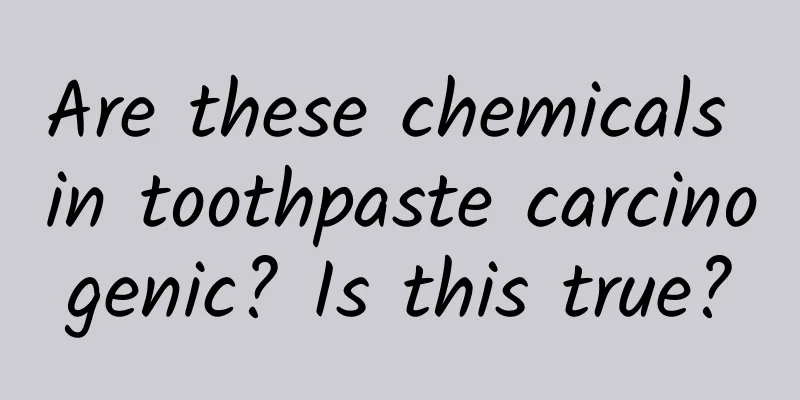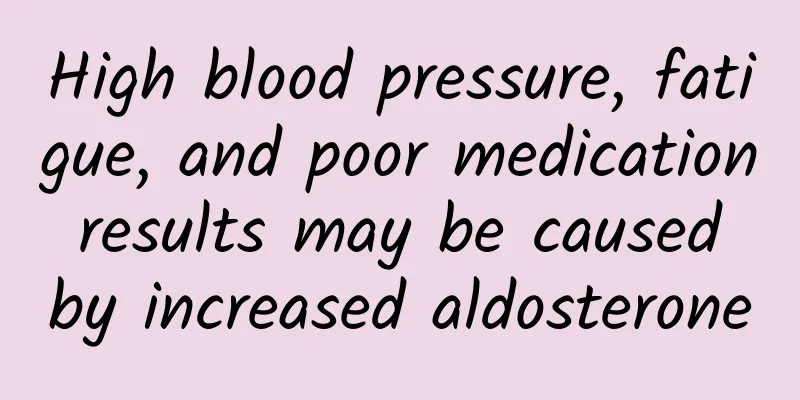Are these chemicals in toothpaste carcinogenic? Is this true?

|
Author: Denovo Science Team Reviewer: Liu Lu, Professor and Doctoral Supervisor, School of Chemistry and Molecular Engineering, East China Normal University gossip Some time ago, a piece of news about toothpaste causing cancer attracted everyone's attention. The article "Three types of toothpaste are included in the carcinogenic "blacklist". Long-term use may cause cancer. Do you have any at home?" points out that the long-term use of many types of toothpaste ingredients (microplastics, triclosan, hydrogen peroxide) may increase the risk of cancer for users. What is going on? Do these toothpastes really cause cancer? Let's find out today. Image source: Weibo screenshot analyze Let me first state the conclusion: current research results show that the toothpaste ingredients mentioned above do not have the risks as rumored. Rumor 1: Microplastics in toothpaste cause Damage to oral mucosa increases cancer risk It is said that toothpaste contains microplastics, so let us first understand what microplastics are? Why are microplastics added to toothpaste? Microplastics refer to plastic particles with a diameter of less than 5 mm. In toothpaste, the diameter of microplastics can be much smaller than 5 mm, as small as tens to hundreds of microns. The role of these tiny plastic particles in toothpaste is to help remove dirt and stains on teeth, thereby achieving a cleaning and whitening effect. Of course, in addition to toothpaste, microplastics are also commonly found in cosmetics. In cosmetics, microplastics are often used as abrasives, stabilizers, fillers, or to increase the viscosity and texture of the product. Rumor: Microplastics in toothpaste can damage oral mucosa and cause cancer (screenshot from the Internet) Will microplastics in toothpaste cause damage to the oral mucosa? There is currently no clear scientific evidence that microplastics in toothpaste can cause damage to the oral mucosa through long-term accumulation. We can also consider it from another angle. When we chew, large and small food particles constantly rub against each other in our mouths, which will not wear out the oral mucosa, so the microplastics in toothpaste are even more insignificant. Research on the effects of microplastics on human health is a relatively new field, and current research mainly focuses on the impact of microplastics on the environment and their potential impact on the human body through the food chain. Microplastics can be ingested into the human body through breathing and food. Copyrighted stock images, no reproduction is authorized A new study released at the annual meeting of the European United Gastroenterologists in Vienna confirmed for the first time that multiple types of microplastics have been found in the human body. "Feces is where humans first saw human microplastics," said Bettina Liebmann of the Austrian Environment Agency, the author of the study. In 2020, scientists in Rome discovered microplastic particles in the placenta of unborn babies for the first time. These particles were found in the placentas of four healthy women with normal pregnancies or childbirth. In March 2022, scientists at the Free University of Amsterdam in the Netherlands detected microplastics in human blood for the first time. Microplastics have also been found in drinking water, whether tap water or bottled water. As to whether microplastics are harmful to the human body and whether they cause cancer, current scientific research has not yet given a clear conclusion. Rumor 2 : Triclosan in toothpaste causes cancer Triclosan is an antimicrobial agent used in a wide variety of consumer products to reduce or prevent bacterial contamination. It is often added to some antibacterial soaps and body washes, toothpaste, and some cosmetics—products regulated by the U.S. Food and Drug Administration (FDA). Of course, triclosan can also be found in clothing, kitchenware, furniture, and toys—products not regulated by the FDA. Triclosan was first used as an insecticide in the 1960s. The FDA has reviewed data on the effectiveness of triclosan in an all-purpose toothpaste, and the evidence suggests that the triclosan in that product is effective in preventing gingivitis. However, for most other products containing triclosan, the FDA has not received sufficient evidence to show that these products have a health benefit in humans. Regarding the safety of triclosan, studies have shown that high doses of triclosan are associated with decreased levels of certain thyroid hormones, but we do not yet know what these findings mean for human health. Rumor: Using toothpaste containing triclosan may cause cancer (screenshot from the Internet) In a study conducted on mice at the University of Massachusetts Amherst, it was found that triclosan may cause inflammation of the colon. The study showed that short-term, low-dose triclosan exposure can lead to low-grade colon inflammation and ultimately lead to increased colitis and colitis-related colon cancer. However, current studies have only observed these effects in animal models, and data from human studies are still limited. The U.S. Food and Drug Administration (FDA) is still conducting studies on the safety of triclosan, including whether animals exposed to triclosan for a long time will develop skin cancer and whether triclosan breaks down into other chemicals after exposure to ultraviolet light on human skin, but so far these studies have not been completed. Current research has only observed the effects of triclosan in animal models (Source: AI drawing by the author) Although some studies have suggested that triclosan may have negative health effects, there is currently no clear evidence that toothpaste containing triclosan causes cancer. Rumor 3 : Hydrogen peroxide in toothpaste Increased risk of oral cancer Hydrogen peroxide is found in some toothpastes. Hydrogen peroxide is a common bleaching agent that is often added to whitening toothpastes to help remove common food stains from the surface of teeth, making them appear whiter. In whitening toothpastes, hydrogen peroxide is often combined with other ingredients, such as baking soda, to polish the surface of the teeth and gently remove stains, changing the color of the surface enamel. Rumor: Using hydrogen peroxide toothpaste will increase the risk of oral cancer (screenshot from the Internet) A 2022 study systematically evaluated whether hydrogen peroxide used for tooth bleaching has a carcinogenic effect on the oral mucosa. The results showed that hydrogen peroxide in toothpaste does not have a carcinogenic effect on the oral mucosa at all. Generally, hydrogen peroxide is considered "toxic" because of its ability to generate free radicals, including hydroxyl radicals. Research suggests that free radical oxidation reactions with proteins, lipids, and nucleic acids and their subsequent potential pathological damage may be associated with aging, stroke, and other degenerative diseases. However, when used appropriately, exposure to hydrogen peroxide in bleaching treatments is minimal. The human body has various cellular and tissue-level defense mechanisms to prevent potential damage to cells by hydrogen peroxide and to repair any damage. Therefore, if used appropriately, the amount of hydrogen peroxide in toothpaste is minimal and will not cause toxicity due to effective metabolic defense mechanisms. How to choose toothpaste scientifically? How should you choose toothpaste? (Source: AI drawing by the author) There are so many kinds of toothpaste on the market, how should we choose? Fluoride content: It is very important to choose a toothpaste that contains enough fluoride. Fluoride can strengthen the enamel of teeth and help prevent tooth decay. Sensitive teeth: If you have sensitive teeth, choose a toothpaste designed for sensitive teeth. These toothpastes usually contain ingredients such as potassium nitrate or strontium chloride to reduce pain or discomfort. Teeth whitening: Whitening toothpaste can help remove surface stains and make teeth brighter. But be aware that long-term use may cause tooth sensitivity. Avoid abrasive ingredients: For example, toothpastes containing charcoal may wear away the enamel of your teeth, leading to increased sensitivity in the long term. Kid-friendly toothpaste: When choosing a toothpaste for children, consider their age and oral health needs. Children's toothpastes typically contain lower fluoride levels and come in flavors and colors that appeal to children. Correct brushing technique: In addition to choosing the right toothpaste, it is equally important to use the correct brushing technique, such as brushing at a 45-degree angle, gently cleaning all surfaces of the teeth, and brushing for at least two minutes each time. in conclusion Toothpaste sold in my country that complies with relevant laws and regulations and standards does not pose a safety risk. Triclosan, titanium dioxide, and benzalkonium chloride are added to toothpaste products in accordance with national standards and will not cause harm to the human body. Various natural or chemical ingredients may be toxic. The key lies in which products these raw materials are allowed to be used in according to regulations and standards and what the limit on the amount of addition is. All products that are added in accordance with relevant regulations are safe. Planning|Wang Mengru Editor-in-charge|Liu Yantong (internship) The article is produced by Science Popularization China-Starry Sky Project. Please indicate the source when reprinting. The cover image and images within this article are from the copyright gallery. Reprinting and quoting them may lead to copyright disputes. |
>>: What should I do at work tomorrow?
Recommend
Normal estradiol levels
Speaking of estradiol, I believe many friends don...
I feel uncomfortable when I sleep at night when I am five months pregnant.
Most women pay close attention to their bodies wh...
How to eat rambutan (you can eat it by peeling the shell, or process it into candied fruit or jam)
...
How to care for the posterior vaginal fornix
The female body structure is very complex. If it ...
Can I eat boiled eggs during early pregnancy?
As a kind of Chinese fast food, braised eggs are ...
What are the symptoms of not ovulating?
Ovulation is a physiological behavior that every ...
The harm of eating pickled food during pregnancy
In daily life, in order to make food preserve lon...
Is brown bleeding during pregnancy dangerous to the fetus?
Pregnancy is both a happy and painful thing for w...
How many days of bleeding is normal after miscarriage
In fact, when miscarriage occurs, the harm to wom...
What to do if you have severe uterine cold?
Most women with cold uterus will be affected by i...
Do you ovulate in the morning or at night?
Many women want to get pregnant but are unable to...
Can ectopic pregnancy be detected with test strips?
Nowadays, the number of ectopic pregnancies is co...
Yellow urine during pregnancy
When we often stay up late, our urine usually tur...
Girls have lumps in their breasts
Breasts are very important organs for women. They...
What should I do if I get hemorrhoids during breastfeeding? New mothers can do this
Women who are breastfeeding are also prone to hem...









